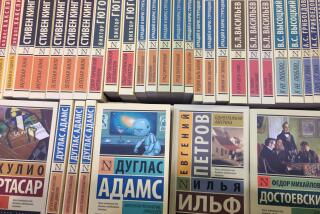TV REVIEW : PBS’ Top-Class ‘Global Rivals’
- Share via
“Global Rivals,” a four-part PBS series analyzing the roots and dynamics of the rivalry between the Soviet Union and the United States, is so educational you probably ought to get college credit for watching it.
That may hardly sound like a reason to turn away from NBC’s Olympic coverage, but tonight’s opener, “Beyond the Cold War” (10 p.m. on Channel 28), is more like a great classroom lecture than an hour’s worth of homework.
Hosted by Bernard Kalb, who roams Moscow with the eminent Sovietologist Seweryn Bialer, the documentary is laced with familiar historical Cold War footage and features an all-star lineup of such powerful geopoliticos as Henry Kissinger, Zbigniew Brzezinski and former French President Valery Giscard D’Estaing.
They and several top Soviet officials--several of whom candidly acknowledge the wrecked state of the U.S.S.R.--assess the significance and ramifications of Mikhail Gorbachev’s radical new policies of perestroika and glasnost.
But also interviewed are ordinary Soviet citizens, from shoppers who complain about being unable to find fresh fish to the manager of the Blue Bird jazz club, whose cool Western sounds are an example of fresh Soviet freedoms. Yet as the English-speaking manager points out, the government still sets the drink and food prices, staffs the kitchen and even holds jam sessions to strict timetables.
Kalb and Bialer (the series’ editor-in-chief and co-author of the companion book “The Global Rivals”) are fair but pull no punches and offer none of the usual excuses: The Soviet Union is in desperate shape and Gorbachev knows it.
But as Bialer cautions, though the changes under Gorbachev are undeniably real and enormous compared to five years ago, no one should expect Gorbachev to create a Western democracy or an open, capitalistic society.
Based on the first two excellent programs, “Global Rivals” (co-produced by WNET in New York and Antelope Films of Great Britain) should satisfy anyone looking for an solid course on present and future U.S.-Soviet relations.
More to Read
The complete guide to home viewing
Get Screen Gab for everything about the TV shows and streaming movies everyone’s talking about.
You may occasionally receive promotional content from the Los Angeles Times.






